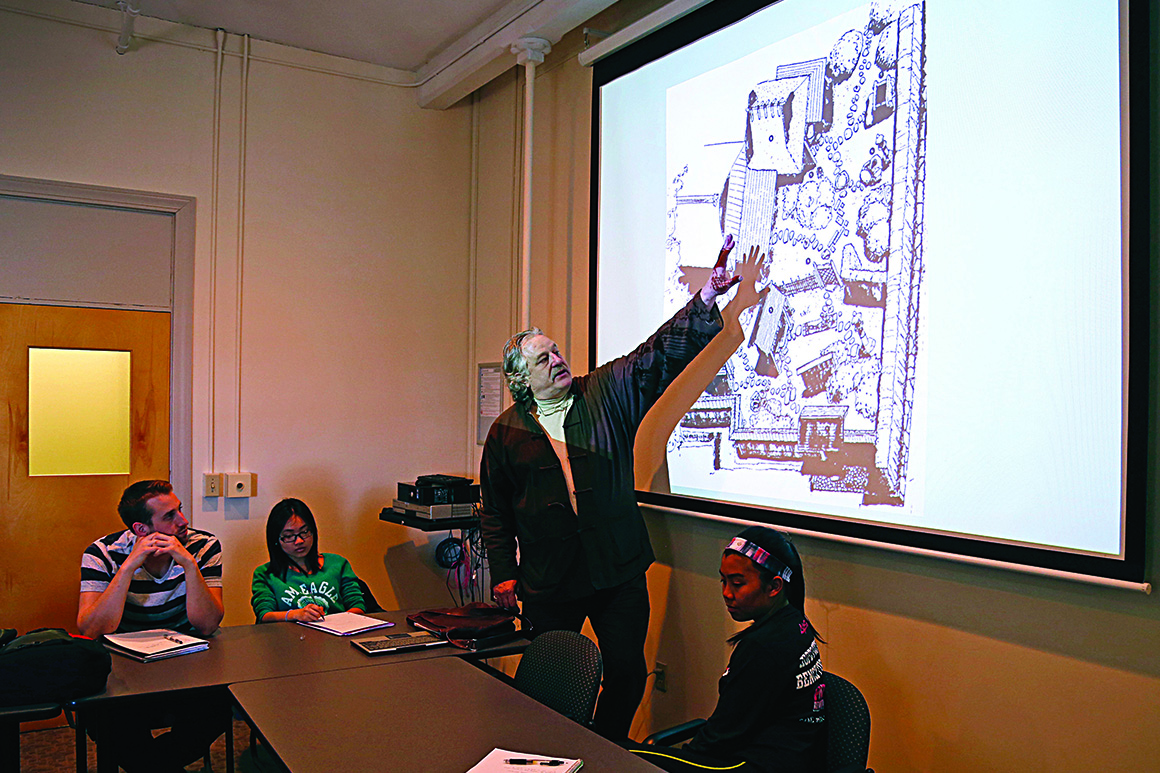Asian Studies
Director: May Sim
Smith Hall 522
Academic Administrative Assistant: Abi Blouin
Stein 435

Todd Lewis, professor of religious studies, is an expert on Buddhism, Hinduism and East Asian religions.
Today’s Asian Studies program at Holy Cross was founded by Asian Studies faculty in the 1980s — but our connections with Asia are built on a tradition that goes back centuries.
Breadth and Depth
Holy Cross has one of the largest Asian studies program among liberal arts colleges. The dynamic and global interdisciplinary program combines the humanities, social sciences, arts and culture, and language study.
Courses and faculty research focus on East Asia (China, Japan, Tibet), South Asia (India, Nepal, Pakistan, Sri Lanka), Southeast Asia (Indonesia, Cambodia, Vietnam), and the Asian diaspora around the world.
The program includes faculty members who are based in 10 departments: economics, English, history, World Languages, Literatures, and Cultures, music, philosophy, political science, religious studies, sociology and anthropology, and theatre.
Jesuit Tradition
Jesuit missionaries worked in India, Japan and China as early as the 16th century. One of the most famous of the Jesuits in China, Rev. Matteo Ricci, S.J. (1552-1610), an Italian, is remembered with great respect for his linguistic expertise and understanding of Chinese culture. Jesuits have continued to work in Asia and in various fields related to Asia as scholars and teachers. The Asian Studies Program continues the Jesuit focus on social justice and cross-cultural understanding in an increasingly diverse, global world.
Multidisciplinary Approach
Students work with Asian Studies faculty to develop a course of study that spans many disciplines.
They may select courses in the Chinese language, linguistics, literature, art, theatre, music, history, philosophy, religion, anthropology, political science and economics taught by faculty with field experience and academic expertise in these areas. They learn to think critically about received traditions; to examine — and re-examine — values and assumptions; to explore the impact of Asia in the past and present, and appreciate the many ways that their knowledge will have an impact in the future.
Chinese Language
A very well developed Chinese Studies language program offers students the opportunity to become fluent in Chinese, and students can study languages during their study abroad experience or with the advice of Asian Studies faculty, at other off-campus sites in the United States.
Asian Studies and the Arts
The Asian Studies Program includes a variety of opportunities for students to participate in and learn from faculty in the arts — a unique feature that distinguishes us from Asian study programs at many other liberal arts colleges.
Faculty offer a wide range of courses in music, dance, and theatre. Students in the program benefit from the international artists, performers and scholars who are invited to campus each semester to perform and teach, as well as professors who are world-renowned artists in their own right, who welcome student involvement in collaborative endeavors. Among them:
- Shirish Korde, an ethnomusicologist and composer, who works with faculty, students, and an international cast of artists to produce concerts and performances related to Asia.
- Lynn Kremer in the theater department has directed a variety of performances on Asian themes and also supervises the Balinese dance program and the gamelan orchestra.
- Anthropologist Susan Rodgers has curated several gallery exhibitions related to her fieldwork and research on Southeast Asian textiles.

